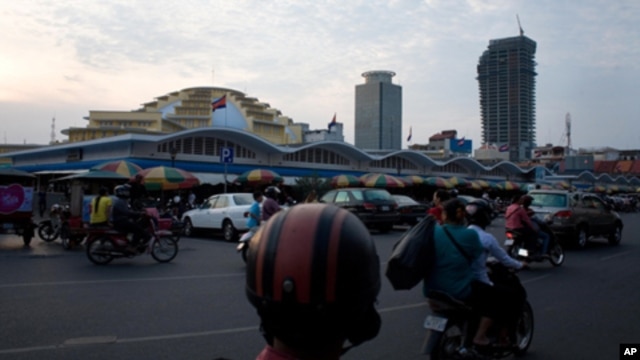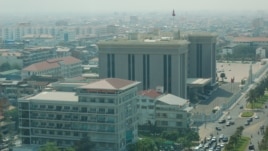30 March 2013
PHNOM PENH — Cambodia could see less
preferential economic treatment by Europe in coming years, as it
graduates as a more developed country, the EU’s ambassador to Cambodia
says.
In an interview with VOA Khmer in Phnom Penh, Ambassador Jean-Francois Cautain said Cambodia currently enjoys tariff exemptions under a scheme called Anything But Arms, which seeks to promote trade with lesser developed countries. But Cambodia’s status under that scheme could change soon with its growing economy, he said.
The threshold for a nation to meet Least Developed Country status is a per capita gross domestic product of $1,000. Cambodia is currently at $900, with an economy growing nearly 7 percent per year. Cautain said other factors, such as a country’s openness and human capital also influence its status.
“Cambodia could get out of this status by the end of the decade,” he said. “Some say by 2020, some by 2018, and some optimists say by 2015.”
However, Cambodia’s economy is heavily reliant on garment exports to the EU, which accounted for more than $1.2 billion, or 25 percent of its exports, in 2011. If the country lost its trade preferences, its products would be less competitive, “posing burdens on its single-export economy,” the ambassador said.
A changed status could also affect aid to the country, he said. Starting from 2014, the EU will focus its aid on Least Developed Countries. In Southeast Asia that would be Burma, Cambodia and Laos, mostly, he said. “So if Cambodia upgrades to a non-LDC country, we will review our cooperation with Cambodia,” he said.
Still, trade and aid reductions would come step by step, he said. “What we are here for is to help Cambodia develop its economy.”
Cambodia could learn from the development of the African country of Botswana, the ambassador said. Botswana moved away from LDC status in 1994, but it did so with good institutions, laws and democratic reforms, he said. “These are the main ingredients for success, and Cambodia sees Botswana as a way to work on that,” he said. “Cambodia is already an open economy, as it welcomes investors, but the issue for Cambodia now is the issue of inclusiveness and a sustainable economy.”
Cambodia should also work hard to fully join the Asean economic community by 2015, especially by focusing on its human capital, the ambassador said. “It’s very important for Cambodia to make sure that [it has]good education and university students can join the labor force to help the economy,” he said.
Cambodia also needs to diversify its economy. Most of its exports come from garments, “which is OK, but not enough,” Cautain said. Better agriculture, including in the rice sector, is needed, he said. That means building the capacity to process rice in country, rather than exporting paddy rice to its neighbors.
Good governance and reduced corruption would also help, the ambassador said. In these areas, “there’s still a lot of work to do.” An improved environment would increase foreign direct investment. European investors are still not comfortable coming to Cambodia, which is still in a transition phase, where trade is supported by donors. That means there is a good basis from which Cambodia can develop itself, he said.
In an interview with VOA Khmer in Phnom Penh, Ambassador Jean-Francois Cautain said Cambodia currently enjoys tariff exemptions under a scheme called Anything But Arms, which seeks to promote trade with lesser developed countries. But Cambodia’s status under that scheme could change soon with its growing economy, he said.
The threshold for a nation to meet Least Developed Country status is a per capita gross domestic product of $1,000. Cambodia is currently at $900, with an economy growing nearly 7 percent per year. Cautain said other factors, such as a country’s openness and human capital also influence its status.
“Cambodia could get out of this status by the end of the decade,” he said. “Some say by 2020, some by 2018, and some optimists say by 2015.”
However, Cambodia’s economy is heavily reliant on garment exports to the EU, which accounted for more than $1.2 billion, or 25 percent of its exports, in 2011. If the country lost its trade preferences, its products would be less competitive, “posing burdens on its single-export economy,” the ambassador said.
A changed status could also affect aid to the country, he said. Starting from 2014, the EU will focus its aid on Least Developed Countries. In Southeast Asia that would be Burma, Cambodia and Laos, mostly, he said. “So if Cambodia upgrades to a non-LDC country, we will review our cooperation with Cambodia,” he said.
Still, trade and aid reductions would come step by step, he said. “What we are here for is to help Cambodia develop its economy.”
Cambodia could also find new agreements with the EU in the future,
Cautain said. “Could be a free trade agreement, such as what we are
negotiating with Vietnam.” But a new agreement would not be as
beneficial as the Everything But Arms scheme, he added.
Cambodia could learn from the development of the African country of Botswana, the ambassador said. Botswana moved away from LDC status in 1994, but it did so with good institutions, laws and democratic reforms, he said. “These are the main ingredients for success, and Cambodia sees Botswana as a way to work on that,” he said. “Cambodia is already an open economy, as it welcomes investors, but the issue for Cambodia now is the issue of inclusiveness and a sustainable economy.”
Cambodia should also work hard to fully join the Asean economic community by 2015, especially by focusing on its human capital, the ambassador said. “It’s very important for Cambodia to make sure that [it has]good education and university students can join the labor force to help the economy,” he said.
Cambodia also needs to diversify its economy. Most of its exports come from garments, “which is OK, but not enough,” Cautain said. Better agriculture, including in the rice sector, is needed, he said. That means building the capacity to process rice in country, rather than exporting paddy rice to its neighbors.
Good governance and reduced corruption would also help, the ambassador said. In these areas, “there’s still a lot of work to do.” An improved environment would increase foreign direct investment. European investors are still not comfortable coming to Cambodia, which is still in a transition phase, where trade is supported by donors. That means there is a good basis from which Cambodia can develop itself, he said.



No comments:
Post a Comment